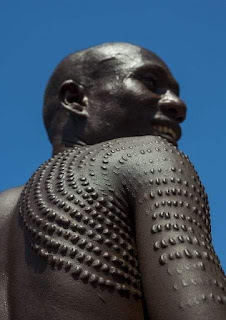Africa has potential to become a global fashion leader – UNESCO
A new report by the United Nations Educational, Scientific and Cultural Organisation (UNESCO) shows that Africa has all it takes to become one of the next global fashion leaders.
"Fashion is really taking off in Africa, and this report shows that it can be developed even further,” said Audrey Azoulay, Director-General of UNESCO.
“In order to achieve this, designers, professionals and the entire production and distribution infrastructure need more support from public decision-makers. The potential is enormous, not only for the economy, but also for young people’s inclusion, women’s empowerment, and for African culture to resonate globally," Azoulay said at the launch of the report at Lagos Fashion Week on 26 October 2023.
The UNESCO analysis shows Africa is a major producer of raw materials (37 out of 54 countries produce cotton), an exporter of textiles to the value of $15.5 billion a year, and an importer of textiles, clothing, and footwear to the value of $23.1 billion a year. There is a growing consumer trend on the continent for fashion made-in-Africa, and the continent is brimming with talent in the fields of haute couture, crafts, and clothing. A 42% increase in demand for African haute couture is expected over the next 10 years.
In its report, UNESCO highlights four challenges which governments and decision-makers must tackle if they want to realise the potential of Africa’s fashion sector. They include strengthening of legal protections for designers and professionals, in terms of intellectual property rights, remuneration levels, working conditions and the ability to organise into professional unions and social rights. It also recommends that investment must be made in small and medium-sized enterprises, which today account for 90% of businesses in the fashion sector in Africa.
Its other recommendations are that environmental standards need to be set, and both the transmission of savoir-faire and formal training need to be improved.
"Across the continent, people are increasingly looking for products 'Made in Africa' which they see as a symbol of pride and a way to affirm their identity. But in order to meet this growing demand, the entire production chain needs to be strengthened. This UNESCO report is useful because it maps out the path to achieve this, and it will increase the awareness of public decision-makers", said Omoyemi Akerele, the Director of Lagos Fashion Week.
In a statement sent to Financial Nigeria, UNESCO said the commitment Lagos Fashion Week to the development of a dynamic creative economy in Africa is in line with the principles set out in the UNESCO Convention on the Protection and Promotion of the Diversity of Cultural Expressions. Recently, UNESCO has produced a series of reports on the strategic importance of cultural and creative industries in Africa, including, a report on African cinema published in 2021, The film industry in Africa: trends, challenges and opportunities for growth.






.jpg)














0 Comments